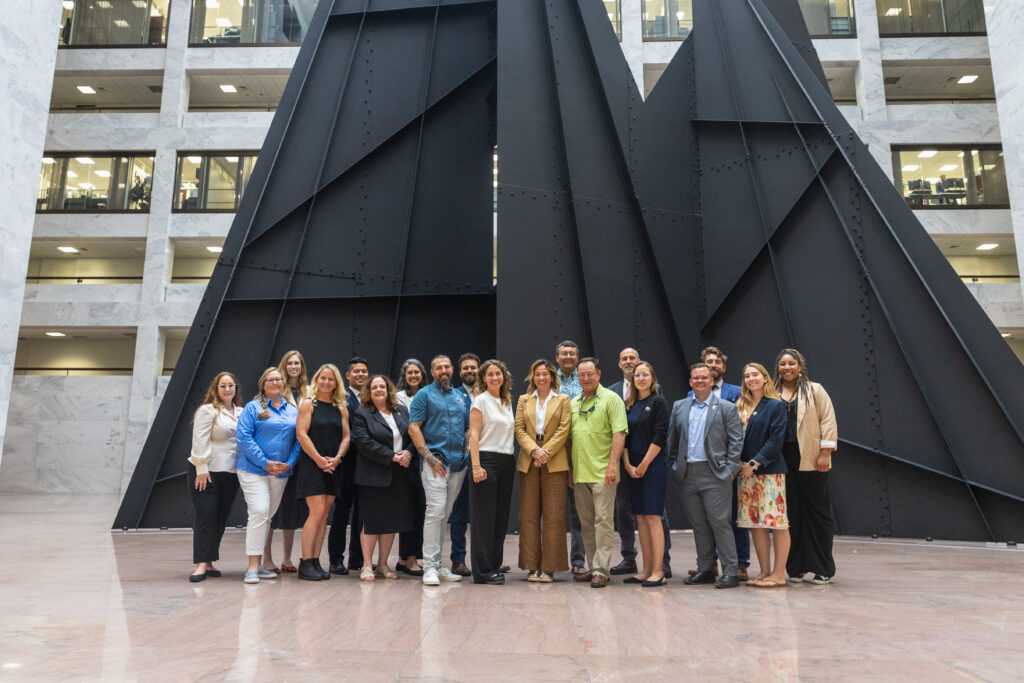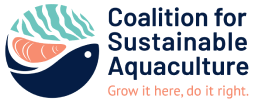Americans increasingly want seafood that’s local, sustainable, and responsibly produced. Yet most of the seafood we consume in the U.S. is imported, making it harder to trace its origin or ensure it was farmed or harvested responsibly.
It doesn’t have to be this way. We have the opportunity to build a robust, science-based aquaculture industry right here at home – one that supports local economies, strengthens our food supply, and brings more trusted seafood to our tables.
The Coalition for Sustainable Aquaculture (CSA) recently took to Capitol Hill to advocate for science-driven policies that will guide the future of American aquaculture. Our diverse delegation – made up of chefs, commercial fishermen, aquaculture innovators, and seafood farmers – visited more than 50 congressional offices to advocate for smart, science-driven policies that can guide the future of American aquaculture. This year, CSA also welcomed 21 new members, signaling a growing and energized movement.
“Being a member of CSA is an important opportunity to advocate for the application of the right aquaculture technology in the right location,” said Megan Sorby, co-founder and CEO of Pine Island Redfish, one of the 21 new members of the coalition. “It is about realizing that we will need all types of production to meet our growing seafood demand.”
Making the Case on Capitol Hill
In meetings with over 50 offices, CSA members spoke with a unified voice: we need a clear, science-informed path forward for sustainable open ocean aquaculture.
Award-winning chefs described the growing demand among diners for local, responsibly sourced seafood – but lamented that limited supply often makes it hard to meet that demand. Aquaculture producers shared their frustration with the lack of a federal regulatory framework, which makes it difficult to expand responsibly. Commercial fishermen emphasized that aquaculture doesn’t need to compete with wild capture – it can complement it, and even provide income during off-seasons
Before aquaculture expands into the open ocean, we must establish robust standards to ensure it is sustainable and has minimal impact on coastal environments. To do so, we must conduct the necessary research to examine what this looks like at a commercial scale in U.S. federal waters. As several CSA members emphasized: the U.S. has the ability to harness cutting-edge tools and technologies. What’s needed now is data-informed policy that ensures we use them wisely – grounded in science, guided by environmental safeguards, and designed to do aquaculture the right way from the start.
“If we want to build a thriving aquaculture industry that earns public trust, we have to lead with science at every step,” said Maddie Voorhees, U.S. Aquaculture Campaign Director at Environmental Defense Fund. “That means grounding legislation in data, research, and real-world experience—so we create policies that are not only effective but also durable and environmentally responsible.”
That message resonated throughout the week. CSA members repeatedly underscored that the U.S. doesn’t need to start from scratch – we already have the expertise, innovation, and momentum. What’s missing is a clear national framework to put it all to work.
“There’s been a total of around $160 million dollars of U.S. investment that’s gone into other countries’ offshore aquaculture projects, using U.S. technology,” said Neil Sims, founder and CEO of Ocean Era. “And those projects are selling their fish where? Back here in the U.S. The U.S. is missing out on opportunities for economic development, job creation, and in producing our own seafood in a way where we can set the quality, sustainability, and production standards.”
Mike Coogan, a marine biologist and research assistant professor at the University of New Hampshire, added, “The U.S. is far behind on aquaculture – but that provides us with an amazing opportunity to learn from the success and failures of other nations, and push for robust science, using the tools and technologies to make sure we’re doing it the right way.”
A Toast to Progress at The Salt Line
The week of action wrapped up with a reception at The Salt Line, the acclaimed waterfront restaurant in D.C. led by CSA member Chef Kyle Bailey. Lawmakers and partners gathered for a night of good food, good company, and conversation about the future of American seafood.
On the menu: sustainably raised seafood from CSA members, including Pine Island Redfish, Blue Ocean Mariculture, Kona Limu Company, as well as Double ‘T’ Oyster Ranch, Riverence, and Harris Creek Oysters.
Speakers, including Representative Mike Ezell and James Chang, Senior Adviser to Senator Brian Schatz, emphasized the momentum behind this effort and the growing bipartisan support in Congress.
A Sustainable Future Within Reach
We’re closer than ever to creating a future where more Americans can enjoy fresh, healthy, U.S.-grown seafood. But to get there, we need strong, bipartisan legislation that builds a responsible aquaculture industry – one that’s rooted in science, protects our ocean ecosystems, and benefits coastal communities.
With continued leadership and collaboration, we can build a thriving domestic seafood supply that reflects our values and meets our needs – for today and for the future.

